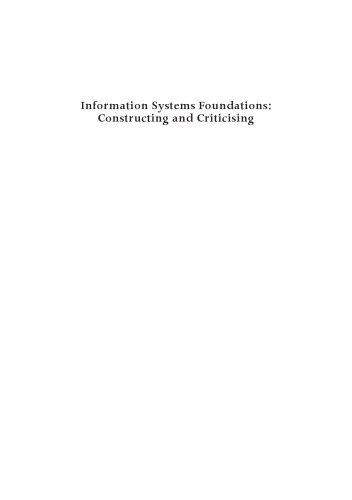

Most ebook files are in PDF format, so you can easily read them using various software such as Foxit Reader or directly on the Google Chrome browser.
Some ebook files are released by publishers in other formats such as .awz, .mobi, .epub, .fb2, etc. You may need to install specific software to read these formats on mobile/PC, such as Calibre.
Please read the tutorial at this link: https://ebookbell.com/faq
We offer FREE conversion to the popular formats you request; however, this may take some time. Therefore, right after payment, please email us, and we will try to provide the service as quickly as possible.
For some exceptional file formats or broken links (if any), please refrain from opening any disputes. Instead, email us first, and we will try to assist within a maximum of 6 hours.
EbookBell Team

0.0
0 reviews 
ISBN 10: 1920942211
ISBN 13: 978-1920942212
Author: Shirley Diane Gregor, Dennis N. Hart
Front Matter (pp. i–ii)
Table of Contents (pp. iii–viii)
Information systems foundations – Dennis Hart and Shirley Gregor (pp. ix–x)
I. Foundations of information systems theory and research
The struggle towards an understanding of theory in information systems – Shirley Gregor (pp. 3–12)
Information systems theory as cultural capital: an argument for the development of 'grand' theory – Douglas Hamilton (pp. 13–24)
The reality of information systems research – John Lamp and Simon Milton (pp. 25–34)
Qualitative research in information systems: consideration of selected theories – M. Gordon Hunter (pp. 35–40)
II. Research methods, reference theories and information systems
The grounded theory method and case study data in IS research: issues and design – Walter D. Fernández (pp. 43–60)
A hermeneutic analysis of the Denver International Airport Baggage Handling System – Stasys Lukaitis and Jacob Cybulski (pp. 61–76)
Information systems technology grounded on institutional facts – Robert M. Colomb (pp. 77–86)
Perhaps it’s time for a fresh approach to IS/IT gender research? – Phyl Webb and Judy Young (pp. 87–98)
Reflection in self-organised systems – Maureen Lynch and Carmen Johan (pp. 99–114)
Strategic knowledge sharing: a small-worlds perspective – Mike Metcalfe (pp. 115–124)
A unified open systems model for explaining organisational change – Doy Sundarasaradula and Helen Hasan (pp. 125–142)
III. Linking information systems theory and practice
Research as an information systems domain – Craig McDonald (pp. 145–152)
A procedural model for ontological analyses – Michael Rosemann, Peter Green and Marta Indulska (pp. 153–164)
Lessons learned from manual systems: designing information systems based on the situational theory of agency – Simon K. Milton, Robert B. Johnston and Reeva M. Lederman (pp. 165–178)
Conversations at the electronic frontier: the information systems business language (ISBL) – Douglas Hamilton (pp. 179–190)
References (pp. 191–222)
information systems foundations
foundations and trends in information systems
foundations of secure information systems
foundations of information systems in business
information systems research foundations design and theory
health information systems the foundations of public health
Tags: Shirley Diane Gregor, Dennis N Hart, Information Systems, Foundations, Constructing, Criticising